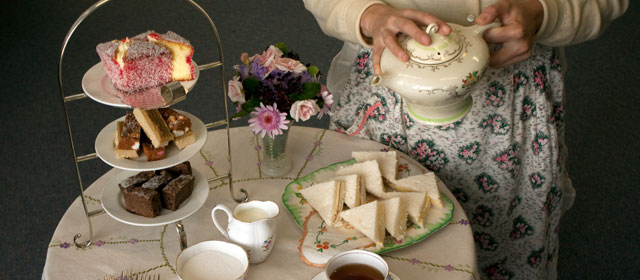He korero whakarapopoto
Social and friendship networks
Nineteenth-century women often spent their time with female relatives. If they lived away from family, women friends and neighbours became important for support. In the 21st century women’s friendships were still very important to them – friends could sometimes act as substitute family.
Socialising at home
In the 19th century it was believed that a woman’s place was in the home. Married women often stayed home caring for children, and did not have their own transport. They seldom left their own neighbourhoods or went into male areas such as pubs. There were few public places where women could meet – and few women’s public toilets.
At first, upper-class women paid formal calls to one another’s homes. Later, women held morning and afternoon teas, with fancy baking, embroidered tablecloths and good conversation.
Family-focused organisations
Women supported one another through childbirth, child-rearing and running a household. Churches set up groups for mothers and wives. Plunket, founded in 1907, taught women about baby care. Plunket’s Mothers’ Clubs allowed mothers to meet – as did New Mothers’ Support Groups from the 1970s. Groups were also set up for the wives of men in particular occupations.
Self-improvement groups
Until the later 20th century women had limited educational and career opportunities. Some women’s organisations enabled members to learn new skills and hear speakers on different topics. They included women’s clubs (for upper-class women), which emerged from the 1890s, and co-operative guilds (for working-class women).
In the 1920s two major rural women’s organisations were set up: the Country Women’s Institute and the Women’s Division of Federated Farmers. They helped to overcome the isolation of rural women.
Service organisations
Women’s service organisations allowed women to make friends while working for community causes. They included Soroptimists, Zonta, Altrusa and women’s friendly societies, which assisted members if they were sick or injured.
Identity-based organisations
Some women’s social organisations were based on shared ethnicity, culture or sexuality. They included:
- Māori women’s organisations such as the Māori Women’s Institutes and the Māori Women's Welfare League
- immigrant women’s groups, which helped new migrants maintain their culture and support each other such as SHAKTI New Zealand that supports women experiencing domestic violence
- Pacific women’s groups, including pan-Pacific organisations such as PACIFICA Inc.
- lesbian networks such as Lesbian New Zealand





